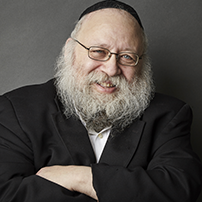
EMPATHY
The tone has been set. We know that we are holy. We know that we have the need to cleanse ourselves by allowing the holiness we absorbed to course through our entire beings to wash and cleanse us. We must be prepared to change our nature in order to awaken the child within us. We must have a sense of humility and the recognition that we have the smaller piece of Matzah at present. We will only have the larger piece of Matzah in the future.
Now we must work with what we have; a small piece of Matzah. We are in the process of getting out of Egypt. This we accomplish by reliving the experience as we recite the Haggadah and fulfill all of the Passover Mitzvot.
We start the recitation of Maggid by announcing that we have poor bread in front of us, “the bread of affliction that our ancestors ate in the Land of Egypt.” This is to verbally set the tone for the Seder that follows. We are able to empathize with those who were slaves in Egypt and all subsequent suffering. These words are intended to instill a sense of humility that all that we have is a minimal understanding symbolized by the Matzah.
A BELATED INVITATION?
That is followed by an invitation to all, including those who are poor and needy, to join us. Obviously, as commentators point out, it is a bit late to start inviting guests. Moreover, the invitation is made indoors so that anyone who is still outside will not be made aware of our invitation.
The invitation is intended as an invitation to ourselves and to all those who are present as well. We should not approach the Seder as onlookers, but as participants. The Seder is our experience of liberation from slavery to freedom and our journey from spiritual impoverishment to spiritual enlightenment.
NOT AN EXERCISE IN FUTILITY
This is followed by a statement that, while we are now here and not free, we will eventually be free in the Land of Israel.
The fact that we are impoverished, and in a spiritual exile, does not mean that we are engaging in an exercise in futility. Equipped with this “poor” piece of Matzah and the recitation of the Haggadah we will get out of exile. Notwithstanding the meager resources we seem to have—a small, broken piece of Matzah and all that it symbolizes—it is still the food of faith that will serve as the seed that will yield the ultimate goal of the future Redemption.
WHERE DO WE BEGIN?
Never Stop Asking Questions
We begin with asking questions. As Jews in exile, it is our responsibility to ask questions. We must not rest until we acquire the knowledge that now eludes us. And we should not stop asking questions until we have the ultimate answer—total Redemption!
After the child (and the child in us) asks the Four Questions, we begin the answer by telling the story of Exodus.
NOT JUST A STORY
The story begins with the bitter Egyptian exile and ends with the liberation.
Maggid is not just telling a story of past events; it is reliving and reexperiencing them, recognizing how they play themselves out in our lives today. It is recounting the physical and spiritual degradation of our people and how drastically it has changed for the better.
It is simultaneously the story of our own struggles in our own Mitzraim and how we can unleash the power of liberation for ourselves and for the entire world this very night.
It is the story that no matter how low we may have fallen, we can be liberated and elevated; and we will be liberated.
And it is a story that relates to every Jew. No matter which child you think you are, the story of the Exodus conveys a meaningful personal message and opportunity for freedom for you.


